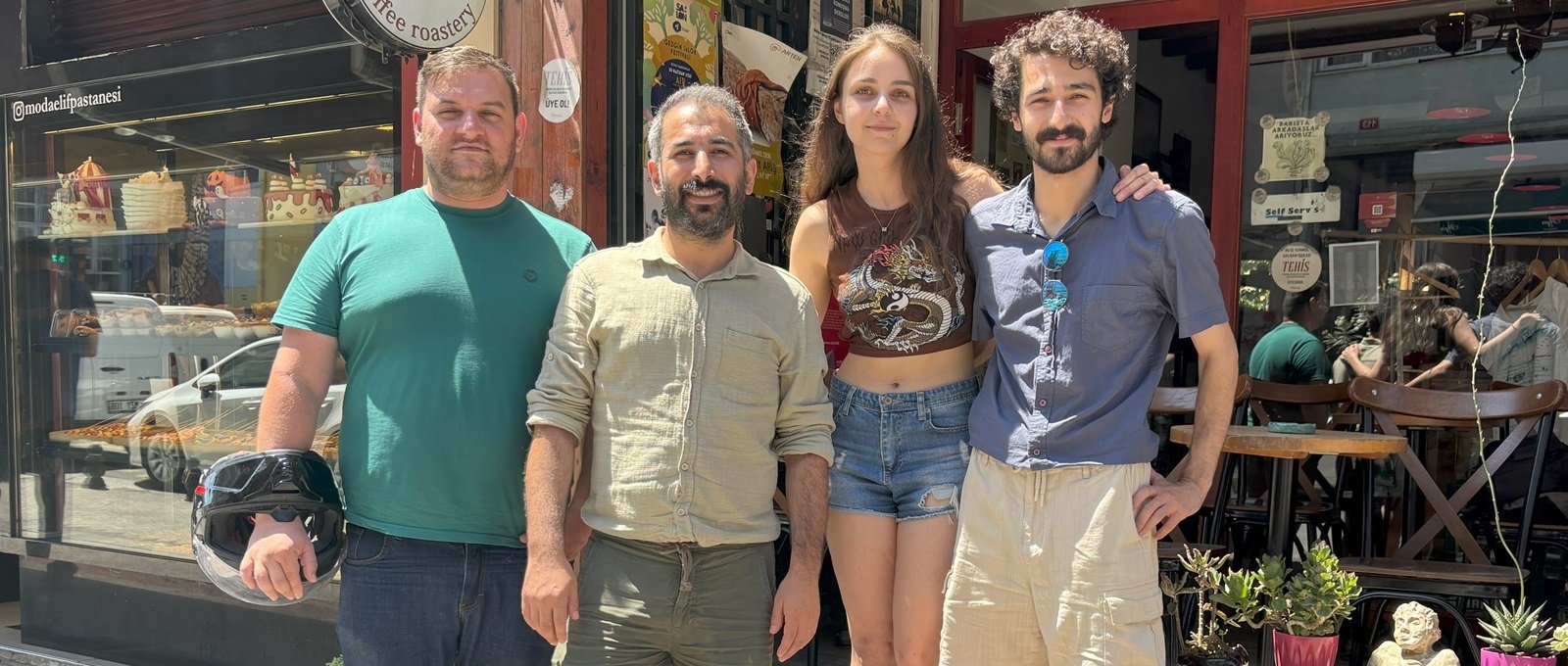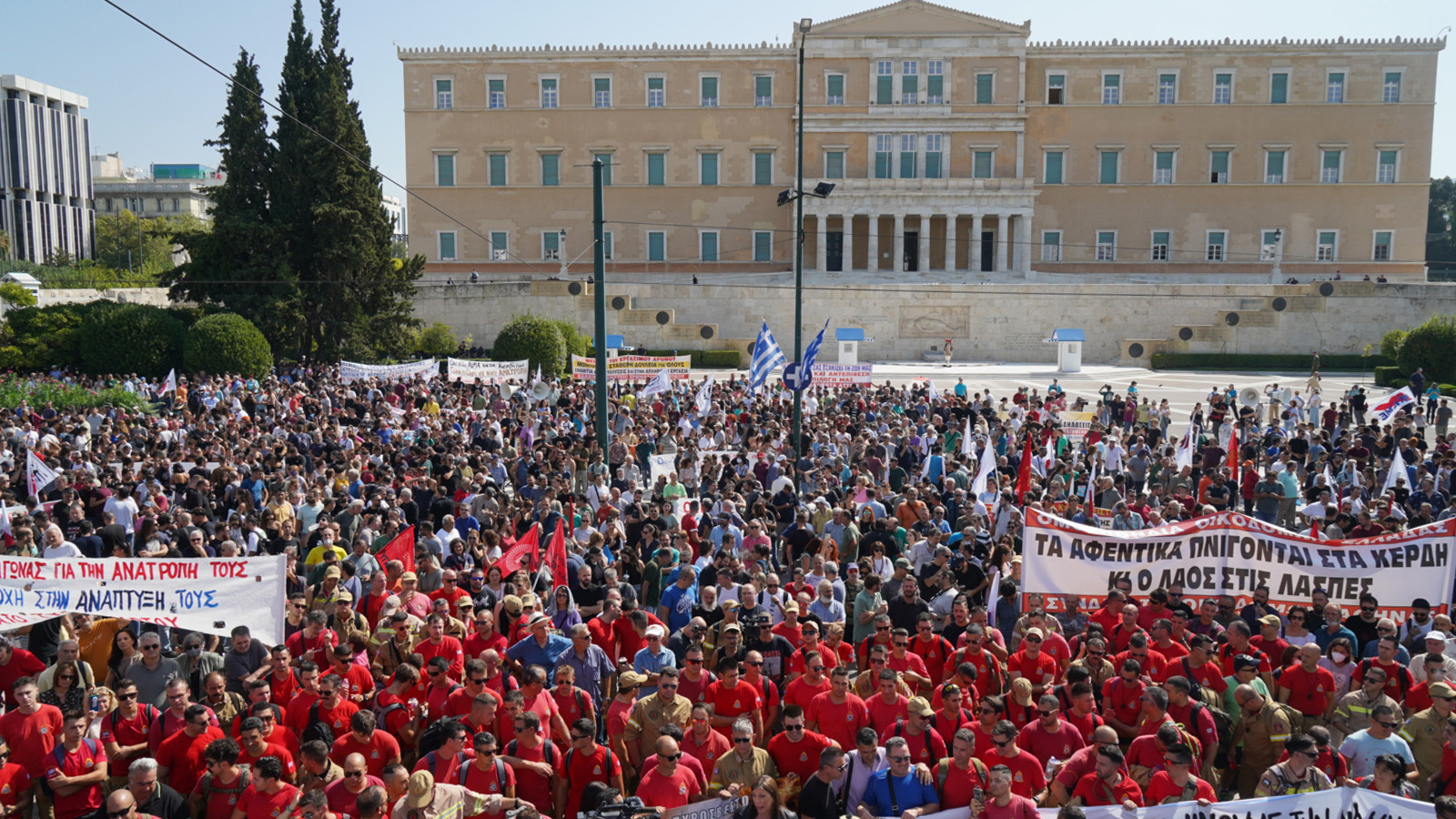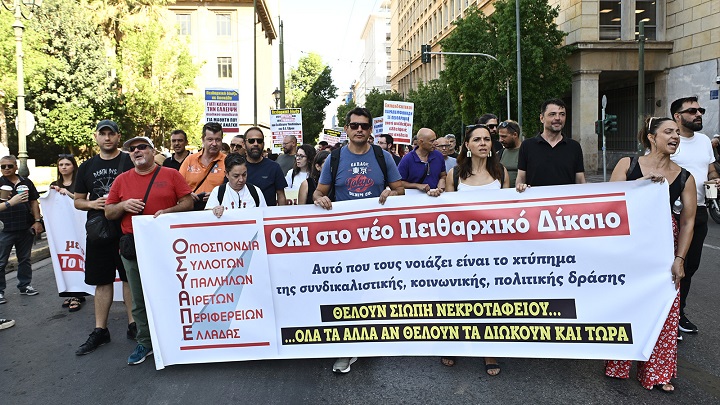
No rights, no future, nothing to lose: Türkiye’s youth take a stand amidst precarity
In Türkiye, fighting for workers’ rights can come at a high cost. According to the ITUC Global Rights Index, the country is one of the ten worst in the world for working people. Tolga Kubilay Çelik, 35, speaks with pride as he recounts being arrested more than 20 times. Three of those arrests led to imprisonment, he notes. The most recent was during a protest calling for the release of Istanbul’s mayor, Ekrem İmamoğlu, who was arrested in March on suspicion of corruption. Çelik is the founder of a trade union born from the harsh realities faced by some of Türkiye’s most precarious workers: self-employed delivery drivers and hospitality workers. He founded the union in December 2020, at the height of the pandemic, under the name TEHİS –the Turkish acronym for the Tourism, Entertainment and Services Workers’ Union.
The son of a shipyard worker in Kocaeli, ‘Kubi’, as he is known among his fellow trade unionists, studied anthropology at Istanbul University. His master’s dissertation focused on the concept of the state as developed by Italian Marxist philosopher Antonio Gramsci. His numerous arrests stem from his involvement in socialist organisations and the Kurdish movement. “It’s in connection with the latter that I’m treated the worst – because I’m not Kurdish,” he says with a smile. He describes himself as a revolutionary and an internationalist.
We meet other members of TEHİS at the café where Çelik works. Among them are Buğra Gültekin, 25, a university student; Meriç Balkan, 28, a PhD candidate and waitress; and Seyhun Kavut, 33, president of the union’s delivery workers’ branch.
While TEHİS is not affiliated with any trade union confederation, according to Çelik, they do collaborate on shared struggles: “We are an independent union, we’re not part of DİSK or Türk-İş. But of course, we come together in protests over workplace accidents, fights for wage increases, and strikes. We also take part in joint statements when laws are passed that affect all workers in the country.”
TEHİS does not meet the legal requirements to be officially recognised as a trade union, as Turkish law (Trade Union Law No. 6356) stipulates that an organisation must represent more than 1 per cent of all workers in the sector nationwide in order to negotiate collective agreements. In larger sectors, this equates to roughly 10,000 members.
Furthermore, self-employed workers are not legally permitted to unionise. TEHİS thus defines itself more as a self-organised platform of solidarity for precarious workers and those on bogus self-employment contracts in bars, cafés, hotels, and, above all, for motorcycle couriers, or motokurye, who suffer the highest fatality rates. The first public protests began in 2020.
While the union currently has just 1,500 active members, most of them young self-employed workers, its voice carries weight – both on the streets and across social media. The sector includes around 130,000 registered delivery workers, though estimates put the real number, including informal workers, at between 250,000 and 300,000. “Between 2022 and 2024, more than 180 delivery workers officially lost their lives, though we believe that the true figure is higher,” warns Kavut.
Through mass protest actions, including blockades, marches, walkouts and public campaigns targeting major companies in the sector – such as Yemeksepeti, Trendyol, Getir and Vigo – TEHİS has secured real gains. These include wage increases, higher bonuses, legal recognition of delivery work as hazardous, a reclassification of risk level (from low to medium), and the introduction of a P1 form that now obliges companies to officially register their delivery workers. “At Yemeksepeti, we staged a 56-day protest action,” says Çelik proudly. TEHİS is also in contact with similar grassroots platforms across Europe and beyond, where delivery workers – pushed to the edge by precarious conditions – are at the forefront of the struggle for labour rights.
Structural precarity and legal consequences
The problems faced by these fasely ‘self-employed’ workers highlight the precarious working conditions endured by young people in Türkiye: they have no insurance and must pay their own bağkur (social security), though 99 per cent cannot afford it. Working hours can reach up to 14 a day, with extremely low wages and a disproportionately heavy tax burden. “We pay 20 per cent tax, while restaurants pay only 1 per cent,” says Çelik.
Repression is constant. Many young people attend protests wearing balaclavas or masks bearing the image of the jailed mayor. “Companies and security forces use surveillance technology, facial recognition and algorithms to identify those taking part in collective actions,” explains Meriç Balkan. For this reason, TEHİS avoids publicly exposing active workers during protests, instead putting forward dismissed employees or sympathisers. “Many workers are afraid of losing their jobs if they take part.”
Elif, 23, a recent political science graduate, takes part in protests and social projects but is not affiliated with any union. “They’ve just raised the minimum wage to 20,000 lira. You can’t find rent for less than that, except for in underground spaces [basements, mezzanines]. How many of these spaces are there in Istanbul for all the precarious youth? I don’t want to emigrate to Europe. I love my country and I want to stay here, but I don’t know what we can do.”
The protests sparked by the arrest of İmamoğlu and dozens of mayors from the main opposition social democratic party, the CHP, are being led by a new generation. “In Gezi, we had hope,” recalls Çelik, referring to the mass protests in 2013 against the escalating social and political repression under Recep Tayyip Erdoğan, who has led the country since 2002. “This new generation has nothing left to lose,” he adds, alluding to the severe economic crisis inflicted by the ruling party, with annual inflation ranging from 20 per cent to 72 per cent since 2018 (and a cumulative inflation of over 500 per cent), alongside a historic 85 per cent collapse of the Turkish lira against the dollar.
The crackdown on protesters has resulted in nearly 1,900 detentions, prompting many young people to conceal their identities. They’re not being punished for breaking the law, but for exercising their rights. The word ‘organisation’ (örgüt) is heavily stigmatised by the current government: many citizens now automatically associate it with terrorism. However, contrary to the government’s intentions, this repression “is sparking a collective awareness of the need to organise,” says Elif, who sees a direct connection between repression, a lack of future prospects, and the urgent need to create a framework of collective support – one that can take root through communication among young people.
The employment collapse: staggering figures
According to the 2024 report by the Turkish trade union confederation DİSK, out of a total of 65.7 million Turks of working age, only 22.5 million have a legal full-time contract – just one in three. The official employment rate stands at 49.3 per cent, but the rate of registered full-time employment is only 34.3 per cent. Only one in five women of working age has a registered full-time job.
While official unemployment stands at 8.7 per cent (3.1 million people), the real unemployment rate is estimated at 25 per cent (9.8 million). “Being young in Türkiye? Degree in hand, dreams on hold. Welcome to the minimum wage exodus,” says Kıvanç Eliaçık, director of international relations at DİSK. Youth unemployment hovers around 37.5 per cent, nearly five times higher than in European countries such as Sweden. In addition, Türkiye has Europe’s highest youth NEET rate – the share of young people not in education, employment or training – at 26.4 per cent, more than double the EU average.
“Young people in Türkiye not only struggle to find employment, they are also trapped in insecure, poorly paid jobs, often in fields completely unrelated to their studies. The mismatch between qualifications and work makes unemployment all the more paralysing,” says Eliaçık.
Women are disproportionately affected by Türkiye’s employment crisis. Funda Bakış, 30, is the provincial representative of the new textile union BİRTEK-SEN in Şanlıurfa. “We were dismissed from Özak Tekstil for unionising, and in response we waged a major struggle that lasted 80 days. And we’re still fighting. From the moment we were denied our right to work and treated unfairly, we began our fight for labour rights and justice. We came out of this with deep, first-hand experience. All the mechanisms of the state were lined up against us: its judicial system, its courts, even the local mufti [a Muslim legal scholar with public authority].”
Bakış denounces the unequal treatment faced by young women in the workplace: “[Employers think] ‘She’s young, she doesn’t know anything, she can’t do anything,” she says. She stresses the vital role of young people in revitalising the trade union movement and emphasises the empowerment that comes from organising: “The greatest hope for young people is the struggle.”
How young people see the labour struggle
Although Türkiye is a founding member of the Organisation for Economic Co-operation and Development (OECD), its labour framework does not grant full collective rights to self-employed workers. Union membership remains extremely low, at just 3 per cent. Among young people, the prevailing view is that major trade unions – without distinction – are bureaucratic and disconnected from their everyday working realities, and even co-opted by business or party interests. They are seen as failing to address key issues for this generation, such as mental health, the environment, migration and youth employment. What’s more, “most young people don’t know how unions work, what they do, or how they achieve their aims,” says Özgür, 22, a political science student. For those most disengaged from politics, trade unions are perceived as distant and symbolic – something you only hear about on the news, online or at protests.
Mistrust, lack of awareness, and the restrictions imposed by Turkish labour law have fuelled the emergence of parallel platforms designed to apply pressure through collective action, given their lack of legal standing to negotiate.
“The material working conditions have changed and the unions need to change with them,” says Elif, who is not affiliated to any trade union but closely follows the youth branches of DİSK, which she considers active and full of potential.
New forms of resistance
Although many young people see emigration as the only way out, they still hold onto hopes for change. Özgür believes that the key lies in creating their own platforms, adding: “If the trade unions can channel that energy, they can revitalise themselves.” Initiatives such as 1000 Youth for Palestine, the textile union BİRTEK-SEN, the teachers’ union DGN-SEN and the construction workers’ union have shown a real capacity for mobilisation. “Social media has become hugely important for young people, and disinformation is a weapon. That’s why trade unions must act to make their voices heard [on social media]. Digitalisation is important for technical reasons, but beyond that, I believe unions need to launch more youth-focused programmes, use the media actively and effectively, and commit to direct communication and constant adaptation – not just to reach young people, but to operate effectively in today’s environment.”
For academic Aslı Odman, a specialist in occupational health, the precarious situation facing young people in Türkiye is structural: extremely high unemployment among university graduates, mounting personal debt, and continued financial dependence on their families.
“Degrees are worthless now, they’re perhaps worth a fifth of what they were 25 years ago.” Many are forced to take whatever work they can find, even when the conditions are dangerous. Education, she adds, has lost its value as a route to upward mobility.
What drives this generation, Odman sums up, isn’t idealism, but exhaustion: “We have nothing to lose – not economically, not culturally – and we’re fed up with all of it.” The recent rise in youth mobilisation, she adds, is also a reaction to the burnout caused by workplace violence, the absence of future prospects, and extreme cases such as worker suicides. In Türkiye, however, unlike in other Mediterranean countries, youth activism is deeply fragmented by the Kurdish conflict, ethnic repression, the Islamisation of education, racism, authoritarianism, and the criminalisation of any cross-cutting alliances.
“The recent protests don’t seek to to transform the system, but rather to collectively resist this form of predatory, dictatorial capitalism,” Odman concludes.
This article has been translated from Spanish by Brandon Johnson
NOT: Marga Zambrana tarafından yapılan röportaj http://equaltimes.org/no-rights-no-future-nothing-to?lang=en adresinde yayınlanmıştır.
Bir Cevap Yazın
E-posta hesabınız yayımlanmayacak. Gerekli alanlar * ile işaretlenmişlerdir
.png)









k6ojc9
ucpun9
zb8n6d
c85rz9
p7a3k1
5ucmif
q1pnmz
izn97a
qf2au8
a8wqs4
enmr11
vaotox
ag006e
dt6hi8
945fui
jk7k1t
8tw00y